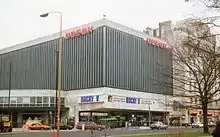Thomas Bennett (architect)
Sir Thomas Penberthy Bennett KBE FRIBA (14 August 1887 – 29 January 1980) was a renowned English architect, responsible for much of the development of the new towns of Crawley and Stevenage.[1]
Biography
Early life
Thomas Bennett was born in 1887 in Paddington, London.[2] He trained as an architect at Regent Street Polytechnic while employed in the drawing office of the London and North Western Railway. He went on to study at the Royal Academy School.
Career
He joined the Office of Works (later Ministry of Works) in 1911. A career in both education and government followed, until setting up his own practice known as TP Bennett in 1921. In 1922, he became a Fellow of the Royal Institute of British Architects.
.jpg.webp)
His practice was responsible for many landmark buildings such as the Saville Theatre, Esso House, John Barnes Department store, Hampstead (since 1986, a branch of Waitrose), Westminster Hospital, a BOAC air terminal, the London Mormon Temple in Surrey and Hawkins House in Dublin.[3] In 1940, he became Director of Bricks at the Ministry of Works, where he was awarded the CBE in 1942, but returned to private practice immediately after the Second World War. He was knighted in 1946.
In 1947, he was appointed as the Chairman of the Development Corporation of Crawley New Town, in West Sussex, a post he held until 1960. In his early days at the Development Corporation, he was responsible for the scrapping of the existing plans for the New Town, and the appointment of Sir Anthony Minoprio to create a new master plan. When the town was built, a new comprehensive school was named for him, opening in 1958. He also took over responsibility for the Stevenage New Town which had been initially the responsibility of Monica Felton.
Sir Thomas Bennett opened the school in Tilgate, Crawley, officially in November 1959. In 1964 he designed the Crawley Chapel of The Church of Jesus Christ of Latter-day Saints.[4] Other T.P. Bennett buildings are the UK Ford HQ at Warley (1965) and the Forton motorway service station (1965).
He was awarded the KBE in 1954. His private practice, T.P. Bennett and Son, expanded into an architectural company and in 1967 was passed to his only son, P.H.P.Bennett, CBE, Chairman of the Joint Contracts Tribunal 1973–1978.
Partial list of buildings

- Marsham Court, Marsham Street, City of Westminster (1937)[5]
- Saville Theatre, Shaftesbury Avenue, London Borough of Camden (1931)
- Esso House, Victoria Road, Victoria (1962)[6]
- John Barnes Department store, Hampstead (1935)
- Hyde Park Chapel, South Kensington, Royal Borough of Kensington and Chelsea (1961)[7]
- London Temple, Newchapel, Surrey (1960)[8]
- Hawkins House, Dublin
Death
He died on 29 January 1980.
References
- "Obituary: Sir Thomas Bennett – Architect and public servant". The Times. The Times Digital Archive.
- "Thomas Bennett". Find my past.
- "Hawkins House in Dublin". Irish Architecture. Archived from the original on 18 June 2002.
- Hudson, T. P., ed. (1987). "A History of the County of Sussex: Volume 6 Part 3 – Bramber Rape (North-Eastern Part) including Crawley New Town. Crawley New Town: Protestant Nonconformity". Victoria County History of Sussex. British History Online. pp. 92–93. Retrieved 8 September 2012.
- Country Life (magazine). 1987. p. 155.
- Institute of Refrigeration (1964). The Journal of Refrigeration. p. 17.
- Christopher Hibbert; Ben Weinreb; Julia Keay; John Keay (2008). The London Encyclopaedia. Macmillan. pp. 283–. ISBN 978-1-4050-4924-5.
- "London England Temple". LDS England London Mission. Retrieved 30 July 2020.
Further reading
- Gontran Goulden, ‘Bennett, Sir Thomas Penberthy (1887–1980)’, rev. Kaye Bagshaw, Oxford Dictionary of National Biography, Oxford University Press, 2004 accessed 24 Oct 2007